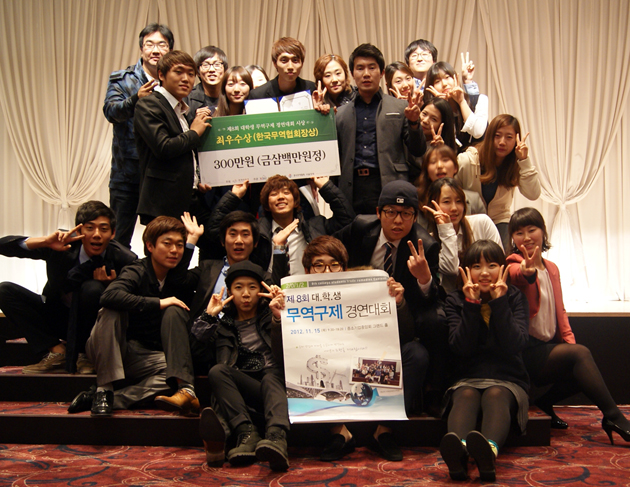Team from School of International Economics and Business Wins the Best Excellence Award in Trade Remedy Contest N
No.88543- Writer YU
- Date : 2012.12.03 11:26
- Views : 10874
International Economic Research Society searches for resolutions to post Korea-US FTA pharmaceutical product safeguard disputes
[November 19, 2012]
[November 19, 2012]

'I.E.R.' Team, won the best excellence award in the '8th University Trade Remedy Contest' (team leader Yook, Kyung-ho, holding plaque in middle of back row)
'How are intellectual property rights for new drugs protected?', 'What are solutions to patent disputes between Samsung and Apple?', 'What about international cooperation for constructing a system to prevent fraudulent issuance of certifications of the origins after the FTA?'...
In a trade remedy contest among university students on trade dispute themes that are difficult even for trade experts to deal with, YU's team won the best excellence award.
The 'International Economic Research Society' (advising professor Chun, Cheong-ghi, hereafter 'I.E.R.') composed of 24 students at the YU School of International Economics and Business, won the honors. They participated in the '8th University Trade Remedy Contest' held at the Korea Federation of Small and Medium Business in the afternoon of the 15th, and won the award (KITA Chairman Award) and a cash prize of 3 million won.
The University Trade Remedy Contest is hosted by the Korea Trade Commission and the Korea Federation of Small and Medium Business, and is sponsored by Seoul Economic Daily, Fair Trade Society, and the Korea International Trade Association. It is an annual nationwide contest that has been hosted since 2005 with the goal of enhancing interest of trade remedy act among college students and to foster expert human resources.
This year, over 150 students from 9 university teams across the nation such as Yeungnam University, Kyunghee University, Dankook University, Dongguk University, University of Incheon, Andong National University, Chonbuk National University, Changwon National University, and Cheongju University participated in the contest. They selected cases of damages to the Korean industry, acts of unfair trade, or violations of international trade standards due to dumping (anti-dumping duties), subsidies (countervailing duties), increase of imports (safeguard) and intellectual property infringements, and competed over a series of procedures from case studies to trade remedy actions. Participating students stated their position in a realistic manner for each issue by taking on roles of plaintiffs, defendants, investigators, head of trade committee and trade committee members.
The YU 'I.E.R' team selected the safeguard (rise in import) dispute case in the pharmaceutical sector, which is a vulnerable sector for the Korean industry with the Korea-US FTA, and presented a solution to the matter, thus winning the award. They made up the process of trade conflicts with the US in the pharmaceutical sector five years after the FTA in 2012, and demonstrated the situation in which safeguards would be put into effect, all the way to the process of lawsuits, appeals, and final rulings.
Yook, Kyung-ho (24, junior in the School of International Economics and Business), who was the team leader, said, "We were able to experience the real work related to trade remedies, even if it was indirectly, while preparing for the contest and we were able to enhance our understanding of cases that we learned through books." He added, "I want to work in a field where I can contribute to the nation in the international commerce sector."
Professor Chun, Cheong-ghi (School of International Economics and Business), who was their advising professor, proudly said, "In a nation like our own in which trade is being expanded through multiple and simultaneous FTAs, the importance of trade remedies will naturally grow. Therefore, this contest was a great opportunity to reconfirm the need for establishing fair trade order in the age of FTAs and the importance of trade remedy programs among students who hope to become commerce experts in the future." He also added with emphasis, "Pan-national efforts should be made to strengthen trade remedy functions by expanding its trade organizations and reinforcing its expert personnel."